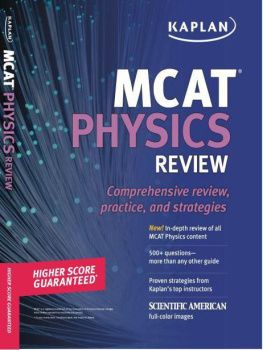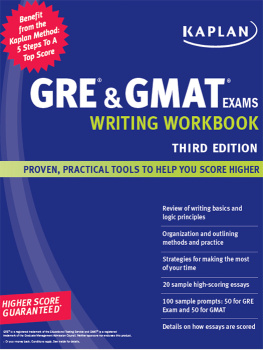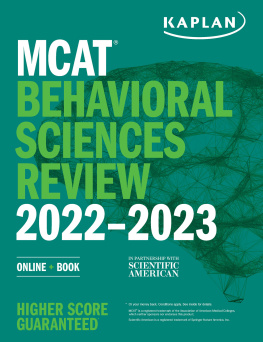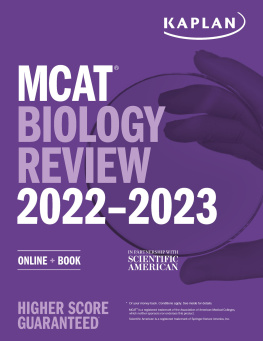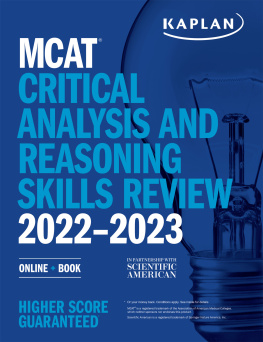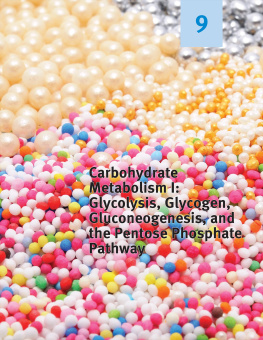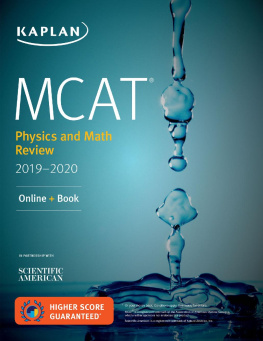MCAT Biochemistry Review
Edited by Alexander Stone Macnow, MD
Table of Contents
Guide
The Kaplan MCAT Review Team
- Alexander Stone Macnow, MD
Editor-in-Chief - Tyra Hall-Pogar, PhD
Editor - Bela G. Starkman, PhD
Editor - Joshua D. Brooks, PhD
Kaplan MCAT Faculty - Alisha Maureen Crowley
Kaplan MCAT Faculty - Samer T. Ismail
Kaplan MCAT Faculty - Kelly Kyker-Snowman, MS
Kaplan MCAT Faculty - Christopher Lopez
Kaplan MCAT Faculty
MCAT faculty reviewers Elmar R. Aliyev; James Burns; Jonathan Cornfield; Nikolai Dorofeev, MD; Benjamin Downer, MS; Colin Doyle; M. Dominic Eggert; Marilyn Engle; Eleni M. Eren; Raef Ali Fadel; Scott Huff; Elizabeth A. Kudlaty; Ningfei Li; John P. Mahon; Matthew A. Meier; Nainika Nanda; Caroline Nkemdilim Opene; Kaitlyn E. Prenger; Uneeb Qureshi; Derek Rusnak, MA; Kristen L. Russell, ME; Michael Paul Tomani, MS; Nicholas M. White; Kerranna Williamson, MBA; Allison Ann Wilkes, MS; and Tony Yu
Thanks to Kim Bowers; Tim Eich; Samantha Fallon; Owen Farcy; Dan Frey; Robin Garmise; Rita Garthaffner; Joanna Graham; Adam Grey; Allison Harm; Beth Hoffberg; Aaron Lemon-Strauss; Keith Lubeley; Diane McGarvey; Petros Minasi; John Polstein; Deeangelee Pooran-Kublall, MD, MPH; Rochelle Rothstein, MD; Larry Rudman; Sylvia Tidwell Scheuring; Carly Schnur; Karin Tucker; Lee Weiss; and the countless others who made this project possible.
About Scientific American
Scientific American is at the heart of Nature Publishing Groups consumer media division, meeting the needs of the general public. Founded in 1845, Scientific American is the longest continuously published magazine in the United States and the leading authoritative publication for science in the general media. In its history, 148 Nobel Prize scientists have contributed 240 articles to Scientific American, including Albert Einstein, Francis Crick, Stanley Prusiner, and Richard Axel.
Together with scientificamerican.com and in translation in 14 languages around the world, it reaches more than 5 million consumers and scientists. Other titles include Scientific American Mind and Spektrum der Wissenschaft in Germany. Scientific American won a 2011 National Magazine Award for General Excellence.
About the MCAT
The structure of the four sections of the MCAT is shown below.
| Chemical and Physical Foundations of Biological Systems |
| Time | 95 minutes |
| Format | - 59 questions
- Score between 118 and 132
- Most questions are passage-based, but some are discrete (stand-alone) questions
|
| What It Tests | - Biochemistry: 25%
- Biology: 5%
- General Chemistry: 30%
- Organic Chemistry: 15%
- Physics: 25%
|
| Critical Analysis and Reasoning Skills (CARS) |
| Time | 90 minutes |
| Format | - 53 questions
- Score between 118 and 132
- All questions are passage-based. There are no discrete (stand-alone) questions.
|
| What It Tests | - Disciplines:
- Humanities: 50%
- Social Sciences: 50%
- Skills:
- Foundations of Comprehension: 30%
- Reasoning Within the Text: 30%
- Reasoning Beyond the Text: 40%
|
| Biological and Biochemical Foundations of Living Systems |
| Time | 95 minutes |
| Format | - 59 questions
- Score between 118 and 132
- Most questions are passage-based, but some are discrete (stand-alone) questions
|
| What It Tests | - Biochemistry: 25%
- Biology: 65%
- General Chemistry: 5%
- Organic Chemistry: 5%
|
| Psychological, Social, and Biological Foundations of Behavior |
| Time | 95 minutes |
| Format | - 59 questions
- Score between 118 and 132
- Most questions are passage-based, but some are discrete (stand-alone) questions
|
| What It Tests | - Biology: 5%
- Psychology: 65%
- Sociology: 30%
|
| Total |
| Testing Time | 375 minutes (6 hours, 15 minutes) |
| Questions | 230 |
| Score | 472 to 528 |
The MCAT also tests four Scientific Inquiry and Reasoning Skills (SIRS):
- Knowledge of Scientific Concepts and Principles (35% of questions)
- Scientific Reasoning and Problem-Solving (45% of questions)
- Reasoning About the Design and Execution of Research (10% of questions)
- Data-Based and Statistical Reasoning (10% of questions)
The MCAT is a computer-based test (CBT) and is offered at Prometric centers during almost every month of the year. There are optional breaks between each section, and there is a lunch break between the second and third section of the exam.
Register online for the MCAT at www.aamc.org/mcat.
For further questions, contact the MCAT team at the Association of American Medical Colleges:
MCAT Resource Center
Association of American Medical Colleges
(202) 828-0690
www.aamc.org/mcat
How This Book Was Created
The Kaplan MCAT Review project began in November 2012 shortly after the release of the Preview Guide for the MCAT 2015 Exam, 2nd edition. Through thorough analysis by our staff psychometricians, we were able to analyze the relative yield of the different topics on the MCAT, and we began constructing tables of contents for the books of the Kaplan MCAT Review series.
Writing of the books began in April 2013. A dedicated staff of 19 writers, 7 editors, and 32 proofreaders worked over 5000 combined hours to produce these books. The format of the books was heavily influenced by weekly meetings with Kaplans learning-science team.
These books were submitted for publication in late March and early April 2014. For any updates after this date, please visit www.kaplanmcat.com.
The information presented in these books covers everything listed on the official MCAT content listsnothing more, nothing less. Every topic in these lists is covered in the same level of detail as is common to the undergraduate and postbaccalaureate classes that are considered prerequisites for the MCAT. Note that your premedical classes may cover topics not discussed in these books, or they may go into more depth than these books do. Additional exposure to science content is never a bad thing, but recognize that all of the content knowledge you are expected to have walking in on Test Day is covered in these books.
If you have any questions about the content presented here, email .
Each book has been vetted through at least six rounds of review. To that end, the information presented is these books is true and accurate to the best of our knowledge. Still, your feedback helps us improve our prep materials. Please notify us of any inaccuracies or errors in the books by sending an email to .
Using This Book
Kaplan MCAT Biochemistry Review, along with the other six books in the Kaplan MCAT Review series, brings the Kaplan classroom experience to youright in your home, at your convenience. This book offers the same Kaplan content review, strategies, and practice that make Kaplan the #1 choice for MCAT prep. After all, twice as many doctors prepared with Kaplan for the MCAT than with any other course.




